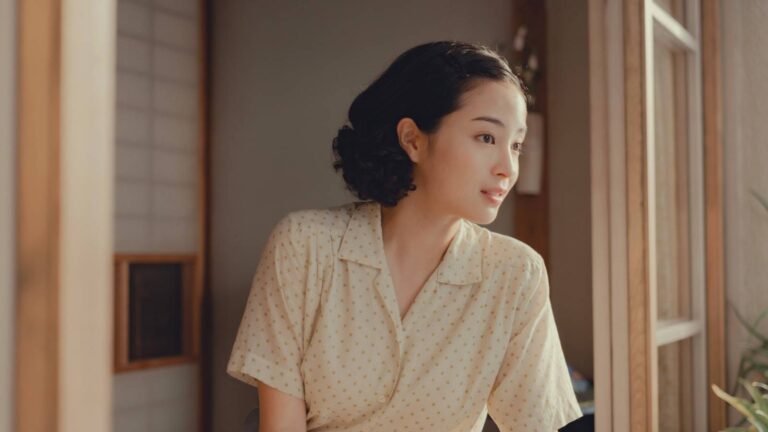Straddling two time durations and a number of other very completely different girls, Kei Ishikawa’s A Pale View of Hills provides viewers quite a bit to chew on. It goals to be each a snapshot at a really particular second in historical past and an exploration of motherhood, the impression of conflict, and grief. Once I caught it at the Toronto International Film Festival, I very a lot needed to get pleasure from it, however one thing held me again from connecting utterly.
The twin timeline begins in 1952 Nagasaki, Japan, seven years after the atomic bomb. Housewife Etsuko (Suzu Hirose) is constructing a house along with her husband Jiro (Kôhei Matsushita) in a metropolis steadily placing itself again collectively following the conflict. With Jiro typically working, Etsuko finds herself drawn towards Sachiko (Shogun‘s Fumi Nikaidō), a mysterious girl who sparks intrigue as a result of her relationship with an American soldier and her wild younger little one.
Years later, in 1982 England, A Pale View of Hills turns its consideration to an older Etsuko (Yoh Yoshida) and her daughter Niki (Camilla Aiko) as they filter the previous’s residence in preparation of a transfer. Niki, a journalism scholar, is keen to study extra about her mom’s previous life in Nagasaki, however as she asks her questions and learns extra of the previous, the reminiscence of her deceased sister threatens to overwhelm them each.
A Pale View Of Hills Has Fascinating Concepts And Beautiful Visuals, However Not Sufficient Depth
Primarily based on the novel by Kazuo Ishiguro, A Pale View of Hills is an formidable movie that, regardless of wanting very lovely, would not make the impression that it needs to. Visually, Ishikawa provides the movie a dream-like high quality that’s excellent for an introspective story like this, weaving between the previous and current as Etsuko shares extra of her story.
There’s additionally a haunting tone throughout the movie, with the theme of dropping youngsters looming giant. Keiko, Etsuko’s daughter and Niki’s sister, died someday earlier than the beginning of the 1982 storyline, and her loss permeates that complete arc. It even appears to increase into the previous, as there have been a string of kid deaths in 1952 that aren’t removed from anybody’s thoughts.
Together with the post-war scars most characters carry — some even actually — A Pale View of Hills has a variety of subtext to take care of. Nonetheless, outdoors of Etsuko, few characters really feel very fleshed-out or accessible. One might argue that’s by design, contemplating the twist that comes on the finish, but it surely means we spend many of the movie simply making an attempt to interrupt via to the folks we’re watching.
The solid is powerful and makes an effort to bridge the hole. Hirose and Yoshida each resonate as the 2 generations of Etsuko, with Yoshida particularly shining with a darker side of the character. Nikaidō is sweet as Sachiko, although her character is probably the most thinly-written and thus onerous to pin down. Aiko will get a number of glorious moments as Niki will get nearer to her mom’s fact.
After we study the reality, which is one which reframes the entire film, it rings hole with shock worth somewhat than one thing that was steadily constructed up. The indicators have been there, sure, however the tone of the general ending is at odds with what we might witnessed earlier than. It comes throughout as one thing that maybe belongs to a distinct movie.
This leaves A Pale View of Hills in an odd place. A lot of the movie is melancholic and superbly rendered, however in terms of increase the characters and the required intrigue, it lacks any actual weight. In the end, it’s a attractive movie that is empty inside regardless of all of its fascinating concepts and good intentions. I stored hoping for extra, and I used to be as a substitute neglected within the chilly.
A Pale View of Hills screened on the Toronto Worldwide Movie Pageant.

A Pale View of Hills
- Launch Date
-
September 5, 2025
- Runtime
-
123 minutes
- Director
-
Kei Ishikawa
- Writers
-
Kei Ishikawa
- Producers
-
Elizabeth Karlsen, Mariusz Włodarski, Hiroaki Ishiguro, Miyuki Fukuma
- Visually, the movie is gorgeous and holds an appropriately dream-like high quality.
- The lead actors are all sturdy.
- The characters are sometimes thinly-written, making it onerous to attach with them.
- The ultimate reveal feels extra like shock worth somewhat than an earned reveal.
- The mismatched tones make it onerous to attach with the story on a deeper stage.



